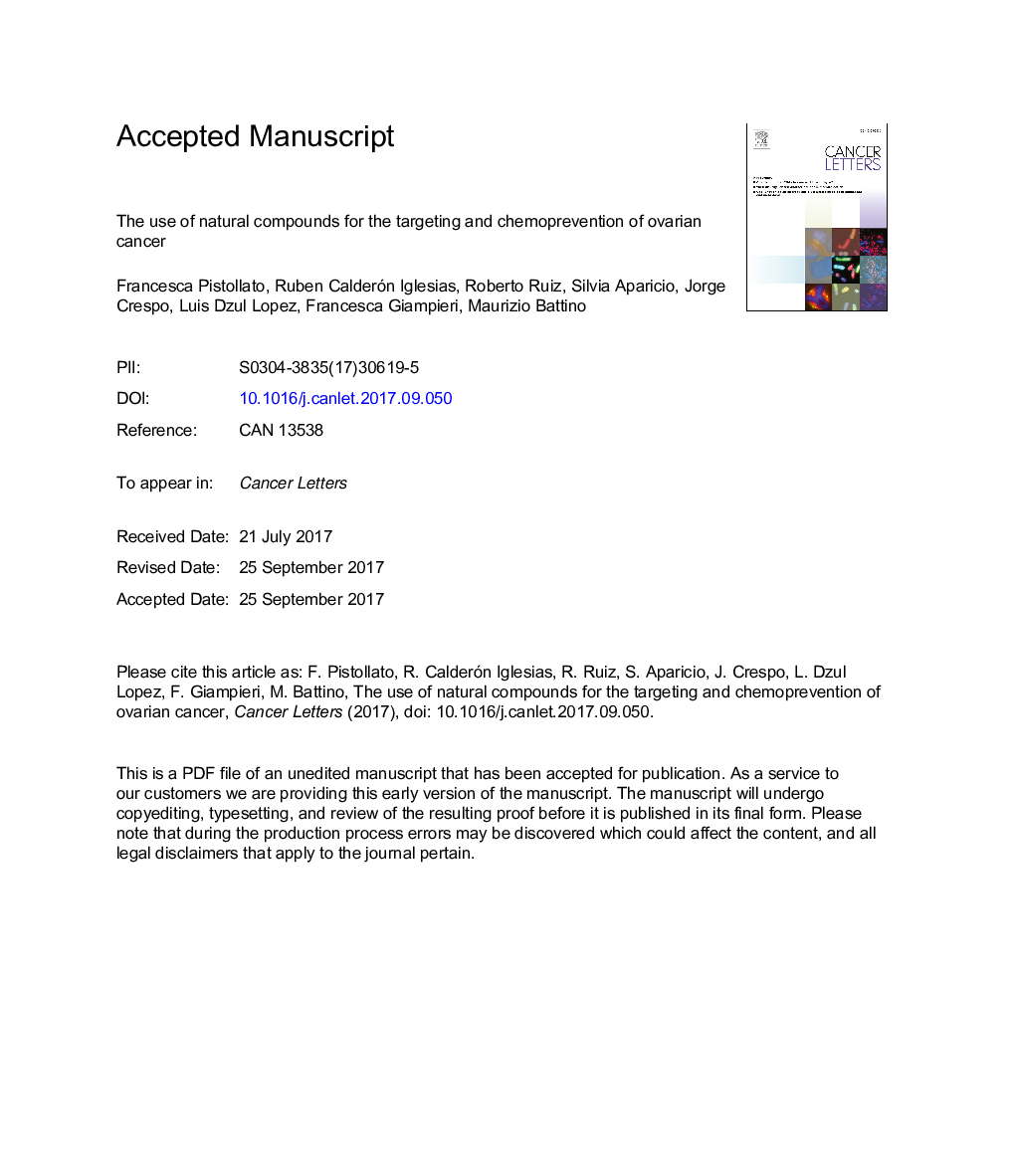| Article ID | Journal | Published Year | Pages | File Type |
|---|---|---|---|---|
| 8435183 | Cancer Letters | 2017 | 30 Pages |
Abstract
Among gynaecological cancers, ovarian cancer represents the leading cause of death in women. Current treatment for ovarian cancer entails surgery followed by combined chemotherapy with platinum and taxane, which are associated, particularly cisplatin, with severe side effects. While this treatment approach appears to be initially effective in a high number of patients, nearly 70% of them suffer a relapse within a few months after initial treatment. Therefore, more effective and better-tolerated treatment options are clearly needed. In recent years, several natural compounds (such as curcumin, epigallocatechin 3-gallate (EGCG), resveratrol, sulforaphane and Withaferin-A), characterized by long-term safety and negligible and/or inexistent side effects, have been proposed as possible adjuvants of traditional chemotherapy. Indeed, several in vitro and in vivo studies have shown that phytocompounds can effectively inhibit tumor cell proliferation, stimulate autophagy, induce apoptosis, and specifically target ovarian cancer stem cells (CSCs), which are generally considered to be responsible for tumor recurrence in several types of cancer. Here we review current literature on the role of natural products in ovarian cancer chemoprevention, highlighting their effects particularly on the regulation of inflammation, autophagy, proliferation and apoptosis, chemotherapy resistance, and ovarian CSC growth.
Keywords
ERK 1/2VEGFAALDH1GSK-3βFOXO3aHIF-1αPax6Bcl2PARPWFALPACXCL12Oct4CXCR4EpCAMIRF1AP1XREepigallocatechin 3-gallateBcl2 associated X proteinARHIRho AWithaferin-APoly(ADP)ribose polymerasesarco/endoplasmic reticulum calcium ATPasemTORCSCEGFRSTAT3PI3KCDKABCG2MmpsMYD88EGCGMAPKMitogen activated protein kinasesROSaldehyde dehydrogenase 1AktAutophagylysophosphatidic acidinterleukinBaxNatural compoundstumor necrosis factor αforkhead box O3aPaired box 6ApoptosisOvarian cancerCancer stem-like cellhypoxia inducible factor 1αantioxidant-response elementVascular endothelial growth factor Aoctamer-binding transcription factor 4TNF-αphosphoinositide 3-kinaseTRAILSERCAB-cell lymphoma 2Signal transducers and activators of transcription 3Matrix metalloproteinasesChemotherapy resistanceC-X-C chemokine receptor type 4mammalian target of rapamycinAREmyeloid differentiation primary response gene 88activator protein 1protein kinase Bextracellular signal-regulated kinase 1/2cyclin-dependent kinaseGlycogen synthase kinase-3βReactive oxygen speciesEpidermal growth factor receptor
Related Topics
Life Sciences
Biochemistry, Genetics and Molecular Biology
Cancer Research
Authors
Francesca Pistollato, Ruben Calderón Iglesias, Roberto Ruiz, Silvia Aparicio, Jorge Crespo, Luis Dzul Lopez, Francesca Giampieri, Maurizio Battino,
